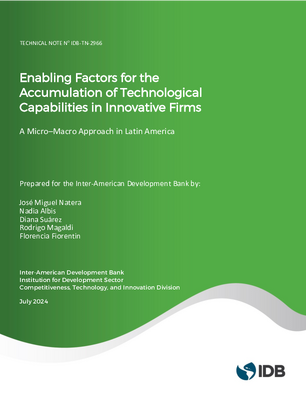Enabling Factors for the Accumulation of Technological Capabilities in Innovative Firms: A Micro-Macro Approach in Latin America
Date issued
Jul 2024
Subject
Economic Development;
Small Business;
Innovation;
Local Economic Development;
Research and Development;
Information and Communication Technology;
Science and Technology;
Debtor Finance;
Infrastructure Development;
Economy;
Export
JEL code
O33 - Technological Change: Choices and Consequences • Diffusion Processes;
O30 - Innovation • Research and Development • Technological Change • Intellectual Property Rights: General;
O12 - Microeconomic Analyses of Economic Development;
O54 - Latin America • Caribbean
Category
Technical Notes
Enhancing the technological capability accumulation process (TCAP) in firms is essential for Latin America's economic development. Yet, the dynamics between firms' characteristics and contextual factors that can help improve TCAP remain underexplored in the region. This study assesses the effects on TCAP of firm-level factors and national innovation systems (NISs)the network of institutions, policies, and relationships governing innovation within a country. Using data from the harmonized Latin American Innovation Surveys Database (LAIS) and a dataset to measure capabilities at the country level, we undertake a multilevel analysis for 20062016 to estimate the effects of NISs and firms structural characteristics on TCAP. Our results reveal that firm size, R&D capabilities, qualified personnel, and macro factors like national R&D investment and scientific output significantly drive TCAP. Conversely, factors such as corruption perception emerge as significant obstacles. These findings underline the complex interplay between innovation policies and firm capabilities, offering nuanced insights for policymakers to foster innovation in Latin America.
NO



